As loving pet owners, we often consider our furry friends to be members of the family, sharing meals and treats with them without a second thought. However, some seemingly harmless foods can pose serious health risks to our dogs. In this article, we'll have a look on six common foods that are toxic to dogs and why they should be kept far away from your furry friend's reach.
Onion
Onions, whether raw, cooked, or powdered, contain compounds that can damage a dog's red blood cells, leading to anaemia. Even small amounts of onion can be harmful, and can cause symptoms such as weakness, vomiting, and difficulty breathing. In severe cases, onion toxicity can be fatal.
Alcohol
While a cold beer might sound refreshing on a hot day, it's important to keep it away from your dog. Alcohol, even in small amounts, can have a profound impact on a dog's liver and brain function. Symptoms of alcohol poisoning in dogs include vomiting, disorientation, and even seizures.
Tomato
Although tomatoes themselves are not highly toxic to dogs, the leaves and stems of the tomato plant contain solanine, which can cause gastrointestinal upset and even neurological problems in dogs. Additionally, if a dog eats a large amount of ripe tomatoes, it could lead to digestive issues.
Grapes (including raisins)
Grapes and raisins are well-known for their toxicity to dogs, potentially causing kidney failure. Even small amounts can be dangerous, leading to symptoms such as vomiting, diarrhoea, and lethargy. Prompt veterinary care is essential if your dog consumes grapes or raisins.
Chocolate
Chocolate contains theobromine and caffeine, both of which are toxic to dogs. Dark chocolate and cocoa powder are especially dangerous due to their high concentration of these compounds. Ingestion of chocolate can lead to vomiting, diarrhoea, tremors, seizures, and even death in severe cases.
Xylitol (Birch Sugar)
Xylitol, a sugar substitute commonly found in sugar-free gum, candies, baked goods, and peanut butter, can be extremely toxic to dogs. It can cause a rapid release of insulin in a dog's body, leading to hypoglycaemia (low blood sugar), seizures, and liver failure. Even small amounts of xylitol can be lethal to dogs.
What to do if your dog has ingested a toxic substance:
If you suspect that your dog has ingested any of these toxic foods, it's crucial to seek veterinary care immediately. Do not attempt to induce vomiting unless instructed to do so by a veterinarian, as some substances can cause further damage on the way back up. Be prepared to provide information about the type and amount of the ingested substance, as well as your dog's symptoms.
Conclusion
As responsible pet owners, it's our duty to educate ourselves about the foods that can harm our beloved canine companions. By being aware of the dangers posed by onions, beer, tomatoes, grapes (including raisins), chocolate, and xylitol, we can take proactive steps to keep these items out of our dogs' reach. Remember, prevention is key when it comes to keeping our furry friends safe and healthy.



0 comments